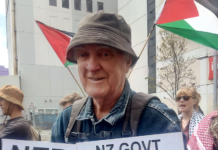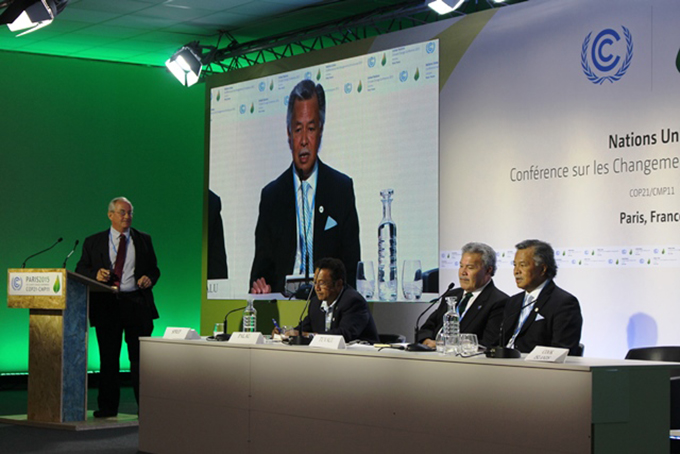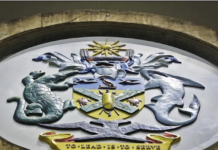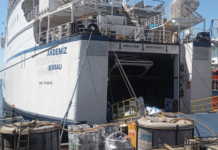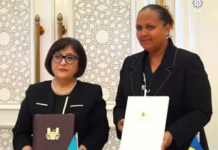Report by Pacific Media Watch in Apia
Pacific delegations to COP21 were part of the historic Paris Agreement on Climate Change reached by negotiators last weekend, SPREP reports.
The agreement includes several key elements that are of particular importance to the Pacific region, including recognition for pursuing a temperature goal of 1.5 degrees Celsius above pre industrial levels, a strengthened mechanism for loss and damage, and the provision for scaled up and simplified access to climate finance for small island developing states.
The Council of Regional Organisations of the Pacific (CROP) agencies have been working as “One Team” to support Pacific island countries with technical assistance during the lengthy negotiation process.
David Sheppard, director-general of the Secretariat of the Pacific Regional Environment Programme (SPREP), commended the leadership and tireless efforts of Pacific leaders in Paris who were “inspirational” throughout COP 21 and noted: “I was extremely proud to be with our Pacific leaders in Paris and to hear the voices of the Pacific on climate change, in this important global platform.”
Small islands around the world worked together, demonstrating the importance of Pacific collaboration with other regions, through the Alliance of Small Island States (AOSIS),
“AOSIS has been instrumental in mobilising a collective voice in the sea of lengthy and intense negotiations, which is evidenced in the position of 1.5 degrees and a mechanism for loss and damage, being included in the final text of the Paris Agreement,” Sheppard said.
Dame Meg Taylor, secretary-general of the Pacific Islands Forum Secretariat (PIFS) and the Pacific Ocean Commissioner, was in Paris for the COP21 meeting and said:
‘Strong outcome’
“This agreement provides a strong outcome for the Pacific. While there were great gains the real work starts now. We must work together to secure climate change finance for the island nations to support adaptation activities.
“Pacific Leaders and their delegations did an amazing job in representing their people and future generations of Pacific islanders. The way in which the CROP agencies worked alongside them highlighted to me once again just how much can be achieved when the region works together towards a common goal.”
The Paris Agreement includes aspects that are legally binding, and includes a five year review of emissions to determine the ability to meet the long term global goal, to “prevent dangerous anthropogenic climate change”.
Other key measures include: to peak greenhouse gas emissions as soon as possible and achieve a balance between sources and sinks of greenhouse gases in the second half of this century; to review progress every five years; and a commitment towards US $100 billion a year in climate finance for developing countries by 2020, with a commitment to further finance in the future.
Small island states, together with least developed countries, have special status with regard to financing and reporting under the Paris Agreement.
The inclusion of “loss and damage” in the Agreement is a significant step towards recognition of the loss and damage that results from the adverse effects of climate change (including extreme weather events and slow onset events) and acknowledgment of the suffering of vulnerable states including small island countries and territories in the Pacific.
Another key implication from Paris will be an overhaul of historic proportions for energy policies worldwide and a huge investment in renewable energy and cleaning up the pollution now being emitted to the Earth’s atmosphere. In the Pacific, this will signal an acceleration of the existing efforts of Pacific island countries and territories to shift to renewable energy.
Globally, every country will now have to commit to reducing emissions.
Key factors on the success of COP21 for the Pacific were the open and transparent manner in which the Government of France led the COP itself and their extensive consultations with stakeholders, Pacific voices and the AOSIS, building upon the lessons learnt from Copenhagen in 2009.
The vice-chancellor of the University of the South Pacific (USP), Professor Rajesh Chandra, welcomed the outcome of COP 21 and said: “The Paris Agreement is a historic win globally, and seeing how the Pacific has been able to influence the COP 21 negotiations, while also working as the ‘moral centre’, is a great show of our abilities and the collaborative potential we have across the region and amongst our CROP agencies.
“It is a great testament of what can be achieved by our island nations, which will be especially important as the world begins to work towards the goals that are set out in the Agreement.”
CROP agencies through the PIFS, SPREP, USP and the Pacific Community (SPC), worked closely and effectively together at COP21 to support Pacific delegations.
The director-general of the Pacific Community (SPC), Dr Colin Tukuitonga, said: The Paris Agreement is an achievement of David and Goliath proportions and our Pacific leaders and delegations must be commended for fronting this monumental challenge with sterling leadership, unwavering commitment and a strong, united voice.
“Against immense odds, the concerns and resolve of small island states are echoed in the pages of this agreement and I would also like to acknowledge the effective cooperation by all partners within the Council of Regional Organisations in the Pacific towards lending vital support to our leaders in their quest for a successful outcome in Paris,” Dr Tukuitonga added.
Further information about the Paris Agreement of the COP 21 can be found here.
Source: Pacific Media Watch 9526





